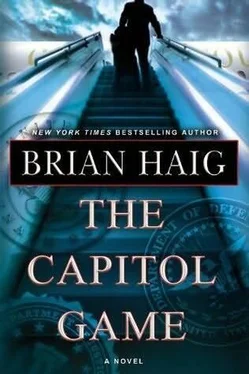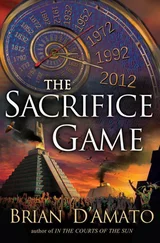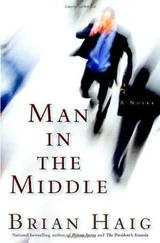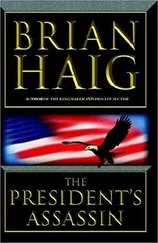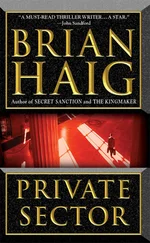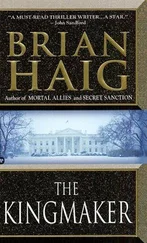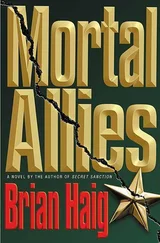“I’d prefer not to say,” Jack replied, avoiding Perry’s eyes.
“You mean you won’t say.”
“All right, that, too.”
“Well, if that’s what you boys want, I think I’ll ask for more. It’s worth a fortune, probably billions. You fellas obviously think so. I’m not giving it away for a song.”
Walters shifted his large bulk and said, “Maybe you missed something here, Arvan. The price is set. This isn’t a used car lot. No haggling, no give. Wiley gave you our final offer.”
“That sounds like a threat.”
“Nice to see you’re paying attention. I can use that tape and pick up the pieces afterward.”
Trying to sound reasonable and restore a little amity to the conversation, Jack said, “Without the polymer you wouldn’t get one million for this company. You couldn’t give it away. You’re a hundred and fifty million in debt, and your business is collapsing around you. Take our price. Get out now while you still can.”
The bluff crumbled in Perry’s lap. “Guess you’re right,” he said, as if he had ever contemplated otherwise.
“Then you agree to the sale?” Walters asked.
“You fellas are holding me up, but you’ve got a deal. Uh… you know, long as you’re assuming the debt, too.”
“That’s part of the package,” Jack assured him quickly, speaking for both of them. Now that they had him on the ropes, it was important to meet his demands; don’t give him a chance to rethink it or back out. Jack told him, “I’ve already negotiated this with the banks. They’re prepared to sign a new covenant tomorrow.”
“And my employees?”
“Same as before. Three months’ severance to any employee who wants to leave. But there is, well, one last condition.”
“What’s that?”
“We’d like to present this to your shareholders and employees as a friendly takeover. We don’t want any complications, strife, or bad feelings. Between your shares and three other large stockholders-Parker, Longly, and Malcome-there’s enough votes to lock this in. This is important, Perry. We expect you to round up their support. Tonight.”
“Then you better offer the shareholders a decent price.”
“Seventy cents a share. That’s more than fair. About twenty percent above today’s market price. There’s thirty million shares outstanding. You own eight million, right?”
“Sounds about right. Mat knows a bit more about it than I do.”
Mat was called back into the room, and while he and Jack fought and haggled over the details, Mitch Walters leaned against Perry’s desk and dreamed about the polymer and its miraculous ability to print money. It was a remarkable coup, one Walters was quite proud of. The Capitol Group would pay Arvan $100 million in cash, hand over another $15 million to the shareholders-for less than $150 million in cash, a pittance, CG would own the most extraordinary military technological breakthrough of the decade. Sure, there was another $150 million in debt, and of course, the $20 million bonus promised to Jack to be factored into the equation: still, the grand total for a corporation with the size, resources, and wealth of the Capitol Group barely came to a rounding error on the annual statement.
It would not be CG’s money, anyway. Not a penny of CG’s capital would be at risk. Within a day he would dispatch a delegation to Russia or the Middle East and see who wanted a piece of the action. Both places were flush with billionaires hunting for profitable investments. The money would come quickly and easily, Walters was sure. Russia’s growing class of fabulously wealthy were particularly anxious to park their cash overseas. And the Saudis and Kuwaitis, given the spike in oil prices, were again flush with petrodollars, a flood of cash, a venture capitalist’s dream.
Two hundred million would be more than enough, but why not go for three? For that matter, why not five hundred?
What a day, what an accomplishment. He planned to get the boys in CG’s publicity department to kick it into overdrive: they could work all night for all he cared. Walters wouldn’t settle for less than the covers of BusinessWeek and Investor’s Business Daily . That night he would make the rounds of a few business cable shows that would allow him to boast and brag to his heart’s content.
A large front-page spread in the Wall Street Journal was something he had always dreamed of, something that now looked like a distinct possibility. He wondered if he could get a copy of the Journal ’s portrait of him as a trophy to hang on his wall. He would put it right behind his desk, just above his head, so it would be impossible to miss. What a statement that would make.
He would use the trip back to D.C. to rehearse and refine his performance. He would be tired by then, but was sure he could muster enough energy and enthusiasm for this one bold stroke, a fast-paced dash through the cable business shows.
Not overly boastful but not humble either, he told himself. Strike just the right note: tout the product and himself but don’t beat it to death. Don’t grandstand but also don’t leave any doubt whose vision and deft hand closed the deal.
It was a chance, the first of his three years as CEO, and he intended to use it for all it was worth.
He was tired of all the former government bigwigs around him. That oversize board filled with grandstanding political has-beens, the sinecures to former admirals and generals, and too many deputy or assistant secretaries of this or that to count. He was tired of the whole stable of Uncle Sam’s former flunkies feeding at his trough. He privately loathed them. He detested their self-importance, their inflated titles, was bored with their exaggerated war stories, nearly wretched at their endless boasting about all the people they knew, the strings they could pull, and the doors they could open.
He sucked up to them, but privately seethed.
Mitch Walters was a businessman, plain and simple. A distinguished graduate of Wharton brought in to manage the exploding complexities of a corporation that had outgrown the mental nimbleness of a bunch of ex-government hacks.
During his years as CEO, he had been bullied and sneered at, treated as little more than a hired flunky, a bookkeeper to the famous clowns above him.
A bunch of condescending, windbag know-it-alls, all of them.
That was about to change.
In a year, as the miracle polymer became the talk of the industry, as more profits poured in than they could possibly count, he would squeeze the board for a fat bonus. It would be a memorable bonus, a record payoff. He had brought home the bacon and would insist on being amply rewarded.
The start point would be seventy million-why not?-but he would settle for a mere fifty, he promised himself.
Why be greedy?
At nine the next morning, the assault began-an army of nosy, cold-eyed accountants, mouthy consultants, and human resources assassins descended on Arvan Chemicals. They scrambled out of four large buses and poured resolutely and quickly through the front door of the plant. All were hired locusts from an arsenal of northeastern consulting firms who would give the company a long-overdue scrubbing. In their gray and blue business suits, and by their calm but chilly demeanors, they were easy to distinguish from the workers wearing stained overalls and strained, anxious expressions.
The assault was well planned, a maneuver rehearsed and perfected countless times as the Capitol Group took over and “turned around” other companies. The consultants were all seasoned veterans. Once they hit the front door they spread out and crashed into every nook and cranny of the business, from the mixing vats to accounting, to the employee records room, to the musty shipping room, to the dreary mail room in the back.
Читать дальше
